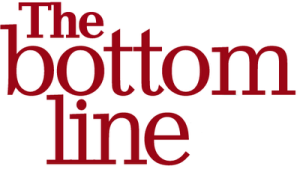 One of the most hackneyed phrases ubiquitous to popular culture: “Bottom line?”.
One of the most hackneyed phrases ubiquitous to popular culture: “Bottom line?”.
As in, for example: “The bottom line is that Nevada mining companies are already paying enough taxes.”
It’s right up there with:
- “you know”
- “like”
- “…I know, right?”
- saying “A” or “first”, but never listing a “B” or “secondly”.
I’m sure you have your pet peeve wasted English euphemisms too, but what scares me about the acceptance of “bottom line” is that it’s a default fallback; the minimally acceptable option.
You hear it in formal speeches, common conversation, and corporate presentations. I get it. “Bottom line?” conveys a certain punctuation in the talk. It’s usually followed by a pause, and then a declarative statement issuing forth a truism on the topic at hand.
Since I listen to endless soundbites on the news every day from people that run the spectrum of socio-economic strata, I’ve come to identify the verbal crutches people use. “Bottom Line?” is one of them. It gives the speaker a moment to think of something pithy to say. Our language is full of those fillers: “That’s a great question…” is one. Another is: “I’m glad you asked that…”
But if you want to take the high road (and shouldn’t we strive for that?), maybe a look at the bottom line is setting our horizon too low?
I realize the acceptable level of education newscasters and authors are pandering to keeps getting lower and lower, but if we constantly play to “bottom lines”…it makes me wonder what the “top line” is.
So instead of a policeman saying: “The bottom line is we should be more careful with use-of-force while on patrol.“…maybe they should be saying: “The top line is: “… use-of-force is an incredibly complicated issue that can’t be summarized easily.”
–OR–
Instead of “The bottom line is that voice-actors need too accept rates of pay in line with what the market allows.”…maybe we should be saying: “The top line is that holding to acceptable standardized rates for this job or that raises the levels of compensation for all of us.”
I think you get my drift. This is one of those rhetorical or philosophical questions that is not easily simplified. But the top-line is: the higher standards you hold too, the more ethical, fair, and equitable your dealings with the world, the more shining your reputation…and the more room you have beneath you to negotiate. Start at the bottom, and see how much wiggle-room there is below you.
CourVO

